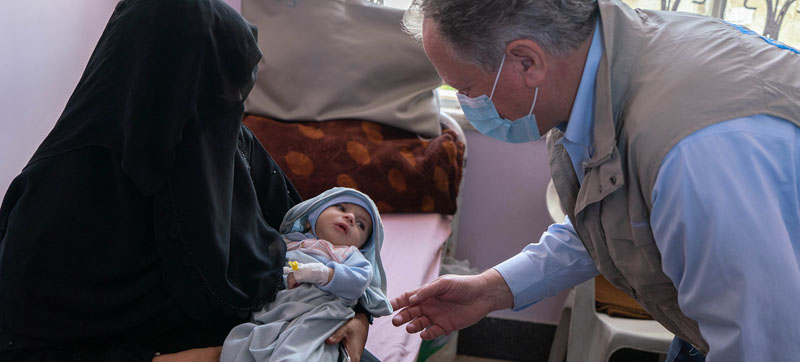 Yemen
Yemen ‘Hell’ in Yemen, with millions ‘knocking on the door of famine’ WFP’s Beasley warns
New York: Over half the Yemen population is facing acute food shortages “with millions knocking on the door of famine”, the UN food relief agency chief said on Wednesday, wrapping up a two-day visit to the country with an urgent plea for peace and funding to help feed vulnerable families.
As famine-like conditions are emerging across Yemen David Beasley, Executive Director of the UN World Food Programme, said “the answer is simple”.
“We have a vaccine for this. It is called food. All we need to save lives is funding”, he spelled out.
Too weak to cry
In the capital of Sana'a, the UN official witnessed first-hand the devastating toll of malnutrition on Yemen's children during a hospital visit where 2.3 million under-five, are projected to face acute malnutrition this year.
And the nearly 400,000 youngsters suffering from severe acute malnutrition are likely to die without urgent treatment.
Mr. Beasley noted “dead silence” in children’s hospital wings as the children were “too sick and too weak to either cry or laugh”.
“But they are still the lucky ones who were able to make it to the hospital”, Mr. Beasley added. “Many poor families cannot afford the cost of transportation to bring their children to hospitals or they arrive and are turned away because there are not enough beds for their sick children.”
Making a difference
The WFP chief also saw the progress that the UN agency’s biometric registration programme is making to ensure that food assistance is delivered in an accountable and transparent way.
Over 16 million Yemenis are food insecure, with nearly 50,000 already facing famine-like conditions (IPC 5 on the official scale) and a further five million only one step away (IPC 4).
Against the backdrop that humanitarian food assistance is the first line defence against the country’s spiralling hunger, WFP is looking at all options to scale up assistance to meet the growing needs and avert a devastating famine.
But more needs to be done for millions who are at risk of slipping further into hunger as conflict and displacement, crippling fuel shortages, and rising food prices makes life harder each day.
Absolute ‘hell’
As fuel reserves are nearing empty, hospitals have been left without power and the commercial sector struggles to transport food and basic goods. This in turn forces people to rely on the black market where jacked-up prices contribute to climbing food costs that are well out of reach for millions.
Meanwhile, 14 fuel-carrying vessels are being held off Yemen's Red Sea coast unable to berth, with none having entered the Hudaydah port since 3 January.
We can make a difference here, but we need the funds to do it -- WFP chief
"This is hell. Absolutely horrendous. Yemen is becoming the worst place on earth and it is totally man made", said Mr. Beasley.
Putting food in mouths
The UN official visited a WFP-run kitchen in Aden that employs local women – many of whom were displaced by conflict and are their families' sole breadwinner – to pack lunches for student and afterwards a school to distribute the lunches to children.
“When we empower women and girls, we take a step towards zero hunger”, he said. “But we need Yemen's war to end so these brave and ambitious girls can grow up to be the doctors, pilots and teachers they want to be.”
Critically underfunded, WFP's ability to maintain its response for Yemenis, hangs in the balance.
Only with predictable and sustained funding can WFP define an implementation plan that meets the needs of the most vulnerable and averts a devastating famine.
WFP needs $1.9 billion to save lives and provide food assistance in 2021: “We can make a difference here, but we need the funds to do it”, said the WFP chief.
Support Our Journalism
We cannot do without you.. your contribution supports unbiased journalism
IBNS is not driven by any ism- not wokeism, not racism, not skewed secularism, not hyper right-wing or left liberal ideals, nor by any hardline religious beliefs or hyper nationalism. We want to serve you good old objective news, as they are. We do not judge or preach. We let people decide for themselves. We only try to present factual and well-sourced news.







